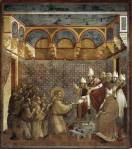 I worshiped with the local Lutherans today (LCMS). It was a very nice morning. The liturgy was rich, the hymnody stimulating, the preaching thoughtful, and the people seemingly very friendly. Though I don’t know it well, I was blessed to share the morning with this part of my family tree.
I worshiped with the local Lutherans today (LCMS). It was a very nice morning. The liturgy was rich, the hymnody stimulating, the preaching thoughtful, and the people seemingly very friendly. Though I don’t know it well, I was blessed to share the morning with this part of my family tree.
As a career pastor, I was struck by the wardrobe adorned by the leadership. The white robes, green sashes, crosses around the neck – it was clear who the consecrated ministers were. And there were several men adorned this way…which made me wonder about how leadership is chosen in this tradition.
![]() So, as I headed out, I picked up a publication in the foyer entitled “What About…Pastors.” In it, an explanation is given for what pastors are, what they do, how they are ordained, and how they should be treated. That’s when I stumbled on this quote from Luther’s Small Catechism:
So, as I headed out, I picked up a publication in the foyer entitled “What About…Pastors.” In it, an explanation is given for what pastors are, what they do, how they are ordained, and how they should be treated. That’s when I stumbled on this quote from Luther’s Small Catechism:
 “When the called ministers of Christ deal with us by His divine command…this is just as valid and certain, even in heaven, as if Christ our dear Lord dealt with us Himself.”
“When the called ministers of Christ deal with us by His divine command…this is just as valid and certain, even in heaven, as if Christ our dear Lord dealt with us Himself.”
Wow.
I’ve been a leader in the church for a quarter century. Not only have I never been treated like this by the people I’ve led, but I have never expected this kind of response. Rather, I have always thought that no right-minded person would have the audacity to equate the validity of his or her leadership to being as valid as Christ’s. To do so would be an over-reach of one’s appropriate role, correct?
In this month’s edition of Christianity Today (Oct. 2013), there is a thoughtful article by Andy Crouch about the role of power in the church. In speaking about “power distance,” he juxtaposes those who create distance between themselves and those they lead through visible expressions of power (high distance), and those who try to look less powerful than they really are (low distance). He then remarks that, “America, today, is about as low power distance as it has ever been – and so is the American Church.”
 I get this, and feel it. I remember from the days of my youth the bumper stickers on many hippie-driven cars and microbuses in Southern California that called us to “Question Authority.” That cultural ethos, coupled with some colossal leadership failures in the public world (Nixon, Bakker, Swaggert, Clinton, Edwards, Haggard, Weiner), have left us with little honor for, and therefore little allegiance to, our leaders. So, we’re uneasy when any leaders claim or flaunt their authority. (As an example…the image to the left is the first one that appears when I did an internet search for “pastor authority.” I think it represents our stereotypes well.)
I get this, and feel it. I remember from the days of my youth the bumper stickers on many hippie-driven cars and microbuses in Southern California that called us to “Question Authority.” That cultural ethos, coupled with some colossal leadership failures in the public world (Nixon, Bakker, Swaggert, Clinton, Edwards, Haggard, Weiner), have left us with little honor for, and therefore little allegiance to, our leaders. So, we’re uneasy when any leaders claim or flaunt their authority. (As an example…the image to the left is the first one that appears when I did an internet search for “pastor authority.” I think it represents our stereotypes well.)
Still, the Bible tells us that authority is both God-given, and very important. Peter tells us to “be subject for the Lord’s sake to every human institution.” This is for our protection, and our advantage, because they are sent by God “to punish those who do evil and to praise those who do good” (1 Peter 2:13-14). But not only do we miss a blessing if we are out from under authority, we are also in incredible danger. Peter tells us elsewhere that “the Lord knows how…to keep the unrighteous under punishment until the day of judgement, and especially those who indulge in the lust of defiling passion and despise authority” (2 Peter 2:9-10). Despising authority is an especially grievous offence to God – and it is standard practice in our 21st century western culture.
 My ancient and medieval brothers and sisters had an understanding of the value of obedience to authorities. The standard vow made by vocational monks and nuns was always to lives of poverty, chastity, and obedience. From the day they were received into the monastery, it was expected that they would give unquestioned obedience to their abbot or abbess – as a sign of their consecration to God Himself. We see that as strange today, don’t we? Do you think they would see our aversion of authority as even more troubling?
My ancient and medieval brothers and sisters had an understanding of the value of obedience to authorities. The standard vow made by vocational monks and nuns was always to lives of poverty, chastity, and obedience. From the day they were received into the monastery, it was expected that they would give unquestioned obedience to their abbot or abbess – as a sign of their consecration to God Himself. We see that as strange today, don’t we? Do you think they would see our aversion of authority as even more troubling?
So…as I try to reconnect myself to the fullness of my Christian lineage, I do find myself longing to be under Biblcial, God-ordained authorities. I know there is blessing for me there. But where do I find it? Who truly has it, and might even expect it? Who exercises it well? And, if they do, whose expression of “power distance” is high enough that I can recognize it?
Lord, forgive me for despising authority. Teach me godly submission. May your church experience your provision of authority in increasingly healthy ways. For your honor’s sake, and for the blessings that are promised.
-EO


